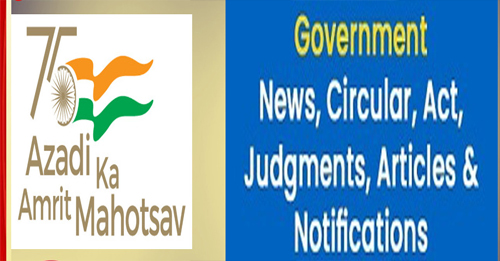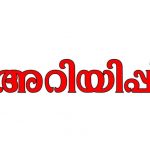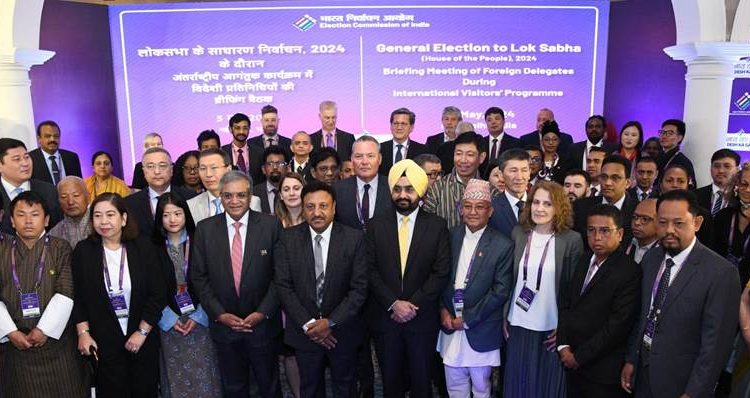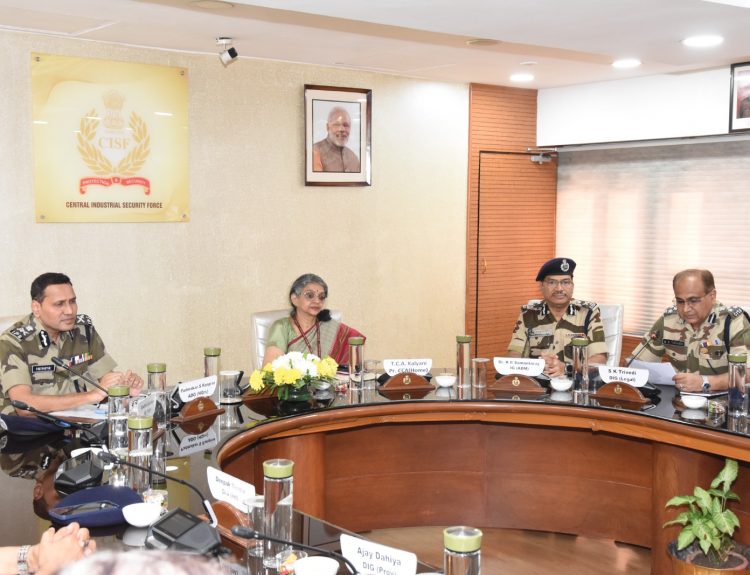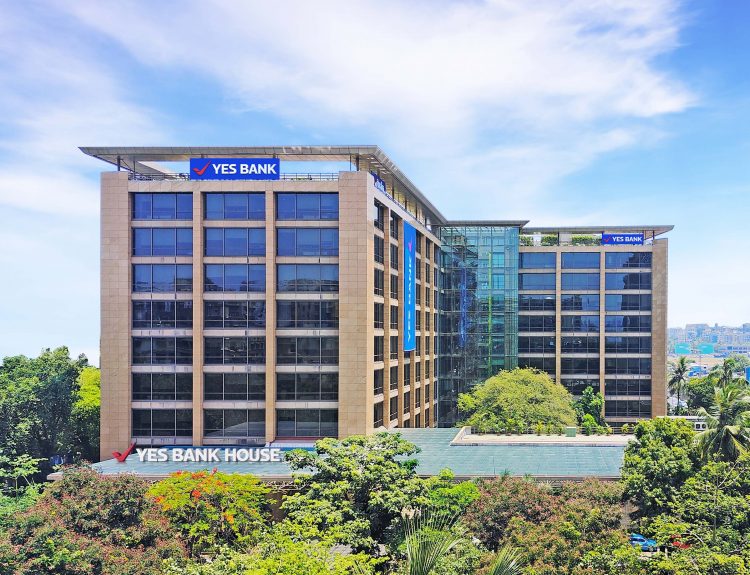PM reviews status and progress of TB Mukt Bharat Abhiyaan
Prime Minister Narendra Modi chaired a high-level review meeting on the National TB Elimination Programme (NTEP) at his residence at 7, Lok Kalyan Marg, New Delhi earlier today.
Lauding the significant progress made in early detection and treatment of TB patients in 2024, Prime Minister called for scaling up successful strategies nationwide, reaffirming India’s commitment to eliminate TB from India.
Prime Minister reviewed the recently concluded 100-Day TB Mukt Bharat Abhiyaan covering high-focus districts wherein 12.97 crore vulnerable individuals were screened; 7.19 lakh TB cases detected, including 2.85 lakh asymptomatic TB cases. Over 1 lakh new Ni-kshay Mitras joined the effort during the campaign, which has been a model for Jan Bhagidari that can be accelerated and scaled across the country to drive a whole-of-government and whole-of-society approach.
Prime Minister stressed the need to analyse the trends of TB patients based on urban or rural areas and also based on their occupations. This will help identify groups that need early testing and treatment, especially workers in construction, mining, textile mills, and similar fields. As technology in healthcare improves, Nikshay Mitras (supporters of TB patients) should be encouraged to use technology to connect with TB patients. They can help patients understand the disease and its treatment using interactive and easy-to-use technology.
Prime Minister said that since TB is now curable with regular treatment, there should be less fear and more awareness among the public.
Prime Minister highlighted the importance of cleanliness through Jan Bhagidari as a key step in eliminating TB. He urged efforts to personally reach out to each patient to ensure they get proper treatment.
During the meeting, Prime Minister noted the encouraging findings of the WHO Global TB Report 2024, which affirmed an 18% reduction in TB incidence (from 237 to 195 per lakh population between 2015 and 2023), which is double the global pace; 21% decline in TB mortality (from 28 to 22 per lakh population) and 85% treatment coverage, reflecting the programme’s growing reach and effectiveness.
Prime Minister reviewed key infrastructure enhancements, including expansion of the TB diagnostic network to 8,540 NAAT (Nucleic Acid Amplification Testing) labs and 87 culture & drug susceptibility labs; over 26,700 X-ray units, including 500 AI-enabled handheld X-ray devices, with another 1,000 in the pipeline. The decentralization of all TB services including free screening, diagnosis, treatment and nutrition support at Ayushman Arogya Mandirs was also highlighted.
Prime Minister was apprised of introduction of several new initiatives such as AI driven hand-held X-rays for screening, shorter treatment regimen for drug resistant TB, newer indigenous molecular diagnostics, nutrition interventions and screening & early detection in congregate settings like mines, tea garden, construction sites, urban slums, etc. including nutrition initiatives; Ni-kshay Poshan Yojana DBT payments to 1.28 crore TB patients since 2018 and enhancement of the incentive to ₹1,000 in 2024. Under Ni-kshay Mitra Initiative, 29.4 lakh food baskets have been distributed by 2.55 lakh Ni-kshay Mitras.
The meeting was attended by Union Health Minister Shri Jagat Prakash Nadda, Principal Secretary to PM Dr. P. K. Mishra, Principal Secretary-2 to PM Shri Shaktikanta Das, Adviser to PM Shri Amit Khare, Health Secretary and other senior officials.
Ayurveda Day to Be Celebrated on 23rd September Every Year
In a landmark decision aimed at enhancing global visibility and consistency in observance, the Government of India has designated 23rd September as the date for celebrating Ayurveda Day each year. This change, notified through a Gazette Notification dated 23rd March 2025, marks a significant shift from the earlier practice of observing Ayurveda Day on Dhanteras, which follows a variable lunar calendar.
Ayurveda Day has been commemorated annually to promote Ayurveda as a scientific, evidence-based, and holistic system of medicine that plays a pivotal role in preventive healthcare and wellness. Until now, Ayurveda Day coincided with Dhanteras, a festival observed in the Hindu month of Kartik (usually October or November). However, as the date of Dhanteras fluctuates each year, the observance of Ayurveda Day lacked a fixed annual date.
The Ministry also noted that in the coming decade, the date of Dhanteras would continue to vary widely between 15th October and 12th November posing logistical challenges for organizing national and international observances.
To address this inconsistency and establish a stable reference point for national and global celebrations, the Ministry of Ayush constituted a committee to examine suitable alternatives. The expert panel proposed four potential dates, with 23rd September emerging as the preferred choice. This decision was guided by both practical and symbolic considerations.
The chosen date, 23rd September, coincides with the autumnal equinox, a day when day and night are nearly equal. This astronomical event symbolizes balance in nature, perfectly aligning with the Ayurvedic philosophy that emphasizes equilibrium between the mind, body, and spirit. The equinox, representing cosmic harmony, underscores the essence of Ayurveda—living in balance with nature.
The Ministry of Ayush urges individuals, health professionals, academic bodies, and international partners to embrace the newly designated date and actively participate in Ayurveda Day celebrations on 23rd September each year. The Ministry sees this shift as an opportunity to further embed Ayurveda into global health narratives and promote its timeless value as a preventive and sustainable healthcare system.
Chhattisgarh’s agriculture and rural development gets a boost with joint efforts of Center and State: Union Minister Shri Shivraj Singh Chouhan and Chief Minister Shri Vishnu deo Sai hold high-level review
Union Minister of Agriculture & Farmer Welfare and Rural Development, Shri Shivraj Singh Chouhan, and Chief Minister, Shri Vishnu deo Sai, conducted a comprehensive review of the Panchayat & Rural Development and Agriculture departments’ work at the Secretariat (Mahanadi Bhawan), Raipur, Chhattisgarh today. The meeting reviewed the effective implementation of state and central government schemes and discussed future development strategies.Union Minister Shri Shivraj Singh Chouhan praised the Chhattisgarh government’s commitment and administrative style, saying the state has done exemplary work in agriculture and rural development. He emphasized that empowering the concept of developed villages and happy farmers is a priority to achieve the vision of a developed India.During the review of the Panchayat & Rural Development department’s schemes, Union Minister Shri Chouhan stressed the need to link the ‘AmritSarovar’ scheme with local livelihoods, which would provide employment to villagers and yield tangible results in water conservation.The Union Minister assured the state government that he would consider revising the labour budget under the Mahatma Gandhi National Rural Employment Guarantee Scheme (MGNREGA) as per their request. He also reviewed the progress of the Pradhan MantriAwasYojana (Gramin) and emphasized the need for swift completion of approved houses and physical verification of new surveys.
Shri Chouhan appreciated the Prime Minister’s Gram SadakYojana and expressed satisfaction with the progress of construction work under the NiyadNelanar scheme in Naxal-affected areas, saying it is taking development to remote and challenging areas of the state.
The Union Minister lauded the ‘Atal Digital SuvidhaKendras’ launched by the Chhattisgarh government in gram panchayats, calling it a revolutionary step towards digital empowerment in the rural economy. He suggested that this innovation to be studied and replicated in other states.
Reviewing the agriculture sector, Shri Chouhan emphasized that to increase farmers’ income; efforts required not only in traditional farming but also in allied areas like animal husbandry, horticulture, and fisheries. He encouraged the adoption of scientific farming practices, high-quality seeds, organic farming, and crop rotation.
Informing about an upcoming initiative‘Viksit KrishiSankalpAbhiyan’ by the Central Government, Shri Chouhan said a team of scientists would be visit various districts in the state to train farmers in practical and scientific farming techniques. He urged the state government for actively participate in this initiative of the central government.
Concluding the meeting, Union Minister Shri Shivraj Singh Chouhan expressed confidence that together, the Central and State Governments will take Chhattisgarh to new heights of development in agriculture and rural development through innovative experiments and commitment.
Chief Minister Shri Vishnu deo Sai stated that the Chhattisgarh government considers rural development and agriculture as the backbone of the state. The Chief Minister also highlighted that it’s a shared responsibility to reach development to remote and deprived areas of the state with the support of the Central Government, and the Chhattisgarh government is firmly committed to fulfilling this responsibility.Shri Sai said that making the rural economy self-reliant, taking digital services to the last mile, and providing skill-based employment to youth is true good governance. He emphasized that their strategy is to bring about change in people’s lives, not just limiting schemes to statistics.
The meeting was attended by Deputy Chief Minister Shri Vijay Sharma, Agriculture Minister Shri Ramvichar Netam, Principal Secretary to the Chief Minister Shri Subodh Singh, Principal Secretary Panchayat Department Smt. Niharika Barik, Secretary to the Chief Minister Shri P. Dayanand, Additional Secretary, Department of Land Resources, Government of India Shri R. Anand, Joint Secretary, Rural Development Department Shri Amit Shukla, Advisor, Ministry of Agriculture Shri Naveen Kumar Vidyarthi, Agriculture Production Commissioner Smt. Shahla Nigar, Secretary, Public Works Department Dr. Kamalpreet Singh, and other senior administrative officials.
Coal Imports During April 2024 to February 2025 Drops by 9.2% Compared to Same Period of FY 2023-24
Coal imports in the country during April 2024 to February 2025 fell by 9.2%, totalling 220.3 million tonnes (MT), compared to 242.6 MT in the same period of previous fiscal year. This reduction resulted in foreign exchange savings of approximately $6.93 billion (₹53137.82 crore). Notably, the Non-Regulated Sector, excluding the power sector, experienced a more significant decline, with imports dropping by 15.3% year-on-year. Although coal-based power generation grew by 2.87% from April 2024 to February 2025 compared to the previous year, imports for blending by thermal power plants sharply decreased by 38.8%. This highlights India’s ongoing efforts to reduce its dependence on imported coal and enhance self-sufficiency in coal production.
The Government of India has implemented several initiatives, including Commercial Coal Mining and Mission Coking Coal, to enhance domestic coal production and reduce imports. These efforts have also led to an encouraging 5.45% growth in coal output during the April 2024 to February 2025 period compared to the same period of FY 2023-24.
India’s coal sector plays a pivotal role in supporting its rapidly growing economy, with coal serving as a primary energy source for critical industries like power, steel, cement etc. However, the country faces a significant challenge in meeting its domestic coal demand, especially for coking coal and high-grade thermal coal, which are in short supply within the country’s reserves. As a result, coal imports have been vital to meet the needs of key sectors, including steel.
The Ministry of Coal has been implementing strategic measures to strengthen domestic production and ensure a secure coal supply, aligning with India’s goals of reducing coal imports and enhancing energy security. By prioritizing domestic coal output, the government aims to march ahead towards Viksit Bharat goal by building a self-reliant, sustainable energy framework that supports long-term economic growth.
TRAI releases report on Operator Assisted Drive Tests (OADT) conducted at 22 locations and surrounding areas during quarter ending December 2024
TRAI, with the assistance of the Telecom Service Providers, conducted Drive Tests at following cities, their surrounding areas and highways, namely: Vijayapura, Chandrapur, Bhopal, Baripada, Warangal, Yamunanagar, Jagadhari, Kurukshetra, Kaithal, Hisar, Jodhpur, Jaisalmer, Junagadh, Diu, Saitual, Khawzawl, Champhai, West and South West Khasi Hills Districts, Faridabad, New Delhi, Sahibabad and Ghaziabad in the quarter ending December 2024.
In OADT, the performance of M/s Bharti Airtel Ltd., M/s BSNL/MTNL, M/s Reliance Jio Infocomm Ltd. and M/s Vodafone Idea Ltd., providing services in a Licensed Service Area (LSA) through various technologies (like 2G/ 3G/ 4G) for voice and data, has been measured by conducting drive test. The observations presented in drive test reports represent the performance of the service providers on the area/ route under test on the day/ time of conducting the drive test.
The following Key Performance Indicators (KPIs) for Voice as well as Data service were assessed for the networks of all Telecom service providers operating in the region:
Voice services: Coverage, Call Setup Success Rate, Drop Call Rate, Block Call Rate, Handover Success Rate and RX quality etc.
Data service: Download and Upload Throughputs, Web Browsing Delay, Video streaming delay and Latency etc.
The details of drive tests conducted are given below:
Regional Office/ Zone
Routes/Areas
Date of OADT
Total Distance covered
(KMs)
RO
Bengaluru
Vijayapura city and surrounding areas
14.10.2024
to 16.10.2024
450 Kms
Chandrapur City and Surrounding Area
11.12.2024
to 13.12.2024
450 Kms
RO Bhopal
Bhopal City and surrounding areas
21.11.2024
to 23.11.2024
415 Kms
RO
Hyderabad
Baripada City and surrounding areas
26.11.2024
to 29.11.2024
430 Kms
Warangal City and surrounding areas
16.12.2024
to 19.12.2024
480 Kms
RO Jaipur
Yamunanagar & Jagadhari City
11.11.2024
to 13.11.2024
200 Kms
Yamunanagar -Kurukshetra – Kaithal – Hisar Highway
14.11.2024
220 Kms
Jodhpur to Jaisalmer Highway
03.12.2024
270 Kms
Junagadh City and Surrounding areas
03.12.2024
to 04.12.2024
140 Kms
Jaisalmer City and Hotspot
04.12.2024
to 05.12.2024
75 Kms
Junagadh to Diu Highway
05.12.2024
175 Kms
RO Kolkata
Saitual, Khawzawl and Champhai Districts and surrounding areas in Mizoram including National Highway 6
28.11.2024
to 29.11.2024
201 Kms
West and South West Khasi Hills Districts and surrounding areas including National Highway 106 in Meghalaya
27.12.2024
to 28.12.2024
473 Kms
RO Delhi
Mathura Road to Faridabad,Sahibabad, Ghaziabad and nearby areas including Sanchar Bhawan, Nirman Bhawan,RML Hospital and TRAI Hqs New Delhi
03.12.2024
to 06.12.2024
150 Kms
The detailed reports are available at TRAI website www.trai.gov.in. For any clarification/information, Shri Tejpal Singh, Advisor (QoS-I) TRAI may be contacted on email: [email protected] or at Tel. No. +91-11-20907759.
Union Minister Shri Ashwini Vaishnaw Unveils India’s First 3nm Chip Design Centres in Noida and Bengaluru
Union Minister for Electronics & Information Technology, Railways, and Information & Broadcasting, Shri Ashwini Vaishnaw today inaugurated two new state-of-the-art design facilities of Renesas Electronics India Private Limited, located in Noida and Bengaluru. Highlighting the uniqueness of the new facility, Shri Vaishnaw informed that this is India’s first design center to work on cutting-edge 3 nanometer chip design, a milestone that places India firmly in the global league of semiconductor innovation. “Designing at 3nm is truly next-generation. We’ve done 7nm and 5nm earlier, but this marks a new frontier,” he said.
The Minister also elaborated on India’s holistic semiconductor strategy encompassing design, fabrication, ATMP (Assembly, Testing, Marking, and Packaging), equipment, chemicals, and gas supply chains. He cited industry confidence witnessed at global platforms like Davos and mentioned significant investments already being made by companies such as Applied Materials and Lam Research. Highlighting the growing momentum in India’s semiconductor ecosystem, the Minister said that the inauguration of this major Semiconductor Design Centre in Uttar Pradesh is a critical step towards developing a pan India ecosystem that harnesses the rich talent available across the country.
To further strengthen the semiconductor ecosystem, the Government of India has been actively encouraging the development of semiconductor design centres in India. The Minister announced the launch of a new semiconductor learning kit aimed at enhancing practical hardware skills among engineering students. He also said that 270+ academic institutions that have already received advanced EDA (Electronic, Design, Automation) software tools under the India Semiconductor Mission will also receive these hands-on hardware kits. “This integration of software and hardware learning will create truly industry-ready engineers. We are not just building infrastructure but investing in long-term talent development,” he said. Shri Vaishnaw praised CDAC and the ISM team for their efficient execution and reaffirmed the government’s commitment to nurturing India into a global semiconductor leader.
Shri Vaishnaw further expressed gratitude to Prime Minister Shri Narendra Modi for including semiconductors as a strategic focus area under his broader Aatmanirbhar Bharat vision. “Within just three years, India’s semiconductor industry has moved from a nascent stage to an emerging global hub, and is now poised for long-term, sustainable growth,” he said. He also added “With manufacturing of electronic products in smart phones, laptops, servers, medical equipment, defense equipment, automobiles and many other sectors, the demand for semiconductors is going to increase exponentially. Therefore, this momentum for growth of semiconductor industry is timely,”
On this occasion CEO & MD Renesas Electronics, Shri Hidetoshi Shibata said that India is a strategic cornerstone for our company, with growing contributions in embedded systems, software, and system innovation. He emphasized Renesas’ commitment to expanding end-to-end semiconductor capabilities in India, from architecture to testing, while supporting over 250 academic institutions and numerous startups through Government-backed initiatives like Chips to Startup (C2S) Programme & Design Linked Incentive (DLI) Scheme. He added that India’s talent strength and shared Indo-Japan strategic interests will help reinvent the global semiconductor lifecycle.
About Renesas electronics
Renesas is an embedded semiconductor solution provider driven by its Purpose ‘To Make Our Lives Easier.’ As the industry’s leading expert in embedded processing with unmatched quality and system-level know-how, we have evolved to provide scalable and comprehensive semiconductor solutions for automotive, industrial, infrastructure, and IoT industries based on the broadest product portfolio, including High Performance Computing, Embedded Processing, Analog & Connectivity, and Power. Renesas, a niche product designer, is setting up a design center with facilities in Noida, Bengaluru and Hyderabad.
Union Home Minister and Minister of Cooperation, Shri Amit Shah, reviews implementation of three New Criminal Laws in Puducherry with Lieutenant Governor Shri K. Kailashnathan in New Delhi
Union Home Minister and Minister of Cooperation, Shri Amit Shah, held a review meeting in New Delhi today with Puducherry Lieutenant Governor (LG) Shri K. Kailashnathan to assess the implementation of three new criminal laws in the Union Territory (UT). The discussion focused on the progress and current status of key provisions concerning police, prisons, courts, prosecution, and forensic services. The meeting was attended by the Home Minister of Puducherry, Union Home Secretary, Chief Secretary and Director General of Police of the union territory, Director General of the Bureau of Police Research and Development (BPR&D), Director of the National Crime Record Bureau (NCRB), along with other senior officials from the Ministry of Home Affairs (MHA) and the Puducherry administration.
In his address, Union Home Minister and Minister of Cooperation Shri Amit Shah said that the Union Territory of Puducherry has done a good job towards the implementation of the three new criminal laws brought under the leadership of Prime Minister Shri Narendra Modi. The Home Minister emphasized on ensuring the early implementation of the new criminal laws. The Union Home Minister said that FIRs in the Union Territory of Puducherry should be registered in Tamil language only and arrangements should be made to make it available in other languages to those who require it. He said that fingerprints of all arrested criminals should be recorded under NAFIS so that the database can be used optimally. He said that only the Director of Prosecution (DoP) should have the right to give legal advice in any case. The Home Minister said that provisions like e-summons, e-Sakshya, Nyaya Shruti and forensics should be fully implemented as soon as possible.
Shri Amit Shah said that the Chief Secretary and Director General of Police of the Union Territory of Puducherry should review the progress of implementation of the new criminal laws once a week, the Home Minister every 15 days and the Lieutenant Governor once in a month.
Regional Power Conference with Western States
The Regional Conference for the Western Region States was held on 13th May in Mumbai in presence of Shri Devendra Fadnavis, Hon’ble Chief Minister, Maharashtra and Shri Manohar Lal, Hon’ble Union Minister of Power and Housing & Urban Affairs.
The meeting was also attended by Shri Shripad Naik, Hon’ble Union Minister of State for Power and New & Renewable Energy, Shri. Ramkrishna alias Sudin Dhavalikar (Hon’ble Minister of Power, Goa), Shri Kanubhai Mohanlal Desai. (Hon’ble Minister of Energy, Gujarat), Shri Pradyuman Singh Tomar (Hon’ble Energy Minister, Madhya Pradesh, through VC) and Smt. Meghana Sakore Bordikar (Hon’ble Minister of State for Energy, Maharashtra).
The meeting saw the participation of the Union Power Secretary, Secretaries (Power/Energy) of participating States, CMDs of Central and State Power Utilities, and senior officers from the Ministry of Power.
Secretary (Power), Government of India (GoI) highlighted that it is crucial to ensure necessary capacity tie-ups as per the resource adequacy plan for upto FY2035 so as to meet future power demand. It is also imperative to make necessary arrangements for development of inter-state and intra-state transmission capacities through various financing models available including Tariff Based Competitive Bidding (TBCB), Regulated Tariff Mechanism (RTM), budgetary support or monetization of existing assets. Further, in wake of recent geopolitical situation, securing the power sector infrastructure, including the transmission grid and distribution systems, is very critical and the States should implement necessary cyber security protocols for the same. In addition, States to also prepare and implement power islanding scheme.
Hon’ble Chief Minister, Maharashtra in his address welcomed the guests and highlighted the key steps taken by the State towards improving the quality and reliability of power supply across the State. He also mentioned about the proposed plan of the State for reducing the AT&C losses and thus reducing the cost of supply. He also requested for support of Central Government on various issues concerning the State especially in restructuring the existing debts of the DISCOM which would help in making them viable.
Hon’ble Union Minister in his address underlined the importance of a future-ready, modern, and financially viable power sector to fuel the country’s growth. He outlined the importance of cooperation and coordination between Central and the State Governments in achieving the goal of Viksit Bharat by 2047. He further remarked that such regional conferences would help in identifying specific challenges and possible solutions. He laid emphasis on ensuring resource adequacy and necessary power purchase tie-ups. Further, the States should also work on developing necessary storage capacities through Pumped Storage Projects and Battery Energy Storage Systems. He emphasized upon the need to enhance the Nuclear Generation Capacity in the country with the target of 100 GW by 2047. He mentioned about the need to create special zones for green energy to achieve Net Zero emission.
He mentioned that the distribution sector is most critical link in the power sector value chain. However, it faces challenges due to poor tariff structures, sub-optimal billing and collection, and delayed payments of Government department dues and subsidies. It is essential to reduce the AT&C losses and the gap between Average Cost of Supply and Average Revenue Realised, to ensure that the distribution sector becomes viable. To achieve that, it is essential that the tariffs are cost-reflective and Government dues and subsidies are paid on time to the DISCOMs.
He commended the States of Gujarat, Goa and Chhattisgarh for their performance in reducing AT&C loses. He also highlighted that distribution utilities should further strive to improve efficiency through implementation of infrastructure and smart metering works under RDSS. In this direction, the Ministry has also facilitated ease for fund flows for smart metering works. He also emphasised that the pre-paid smart meters should be prioritised for installation in Government establishments including Government colonies and should be completed by August 2025. The Smart meter has huge potential to transform the way consumers interact with utilities using the data analytics based on AI/ML tools.
The participating States thanked the Hon’ble Union Minister for necessary guidance and also requested for continuous support of the Central Government for further strengthening the power sector.
IWAI sets up its new office in Srinagar; launches initiatives to develop river navigation infrastructure in J&K
In a move that is set to strengthen the Inland Water Transport (IWT) sector in the Union Territory of Jammu and Kashmir, Inland Waterways Authority of India (IWAI) under the Ministry of Ports, Shipping and Waterways sets up its new office in Srinagar’s Transport Bhawan. The office space has been provided by J&K government. Functional from today, this office will be central to all the IWT works being undertaken by the Authority in the region.
IWAI has signed a Memorandum of Understanding (MoU) with the government of Union Territory of Jammu and Kashmir to develop river navigation infrastructure in three national waterways in the Union Territory i.e. NW-26 (River Chenab), NW-49 (River Jhelum), NW-84 (River Ravi). The Authority will now start the development works under the framework of the MoU. These works include setting up of floating jetties at ten locations in Jammu and Kashmir, development of navigational fairway by dredging wherever required, night navigational aids and regular hydrographic surveys for safe plying of vessels in these waterways.
Under the dynamic leadership of Prime Minister Shri Narendra Modi and the able guidance of Minister of Ports, Shipping and Waterways Shri Sarbananda Sonowal, IWAI has made several infrastructural interventions to develop waterways as a robust engine of growth. With proactive steps like developing IWT terminals and related infrastructure, IWAI is working towards utilizing the immense potential of rivers across the country. The partnership between IWAI and Jammu and Kashmir government is a significant step that promises to promote eco-tourism in the union territory while also stimulating local economy.
CCI approves the proposed acquisition of shareholding in EPL Limited by Indorama Netherlands B.V.
The Competition Commission of India has approved the proposed acquisition of shareholding in EPL Limited by Indorama Netherlands B.V.
The proposed combination envisages the purchase of 24.9% equity share capital of EPL Limited by Indorama Netherlands B.V.
Indorama Netherlands B.V. is a limited liability company established in the Netherlands. It is an indirect subsidiary of Indorama Ventures Public Company Limited.
EPL Limited is engaged in the business of manufacturing and sale of packaging products, including laminated and extruded plastic tubes.
Detailed order of the Commission will follow.



